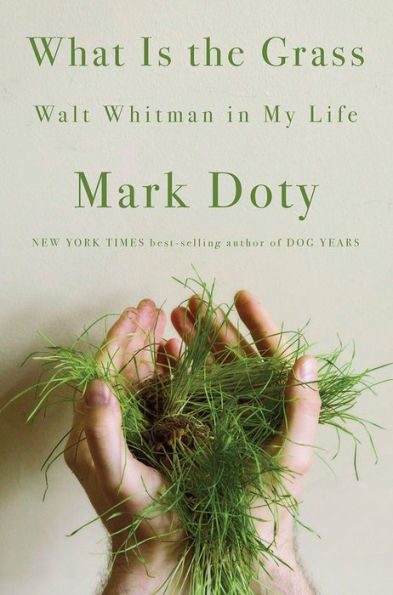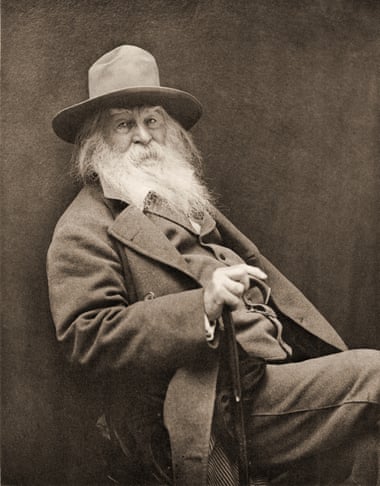“Of the many poets I love, none has haunted me as Walt Whitman,” writes Mark Doty early in his moving book What is the Grass. Defying categories, Doty’s book is part appreciation, part criticism, and part memoir, a book in which the boundaries between Doty and his predecessor are sometimes blurred. Having spent a lifetime reading, studying, and teaching Whitman, Doty — the author of more than a dozen works of poetry and prose — reminds us just how revolutionary, how foundational this poet was, how fresh and surprising the poems remain.
For every atom belonging to me as good belongs to you.
_
Stop this day and night with me and you shall possess the origin of all poems …
_
Walt Whitman, an American, one of the roughs, a kosmos,
Disorderly fleshy and sensual …
 Focusing on the cosmic embrace of Whitman, Doty unfolds the poet’s ecstatic vision. And though Whitman’s version of himself is outsized, both cosmic and earthy, reaching into the past and future at once, Doty also asks us “what poet ever addressed his readers so often and so directly … A digital scan of his work reveals the single word most used … is not the I we might have expected but you.” That you in Whitman’s poems, which could have easily been flat or pedantic, is one of the crucial elements through which the prophetic Whitman reaches beyond the confines of the poem, calling his readers to him.
Focusing on the cosmic embrace of Whitman, Doty unfolds the poet’s ecstatic vision. And though Whitman’s version of himself is outsized, both cosmic and earthy, reaching into the past and future at once, Doty also asks us “what poet ever addressed his readers so often and so directly … A digital scan of his work reveals the single word most used … is not the I we might have expected but you.” That you in Whitman’s poems, which could have easily been flat or pedantic, is one of the crucial elements through which the prophetic Whitman reaches beyond the confines of the poem, calling his readers to him.
Doty identifies what he thinks of as the five sources or streams of Leaves of Grass. “These currents, which can’t entirely be separated from one another, give the book its remarkable freshness; its best pages breathe an air perennially new.” The first such source — “in terms of primacy, not experience” — is the loosening of boundaries, the mystical exhortations that call to us from the first lines of “Song of Myself.” Doty writes that these experiences “come in variations and degrees, from a slight apprehension of the strangeness of being to the ravishing dissolution of boundaries called enlightenment.” These experiences are ecstatically embodied by the “What is the grass?” section of “Song of Myself,” which Doty writes so passionately about. In trying to answer the child’s simple question, Whitman accrues metaphor after metaphor. Doty slowly and gently examines Whitman’s tour de force, one of the most stunning expressions of oneness and wonderment in the English language:
Or I guess it is the handkerchief of the Lord,
A scented gift and remembrancer designedly dropped …
And now it seems to me the beautiful uncut hair of graves …
All goes onward and outward … and nothing collapses,
And to die is different from what any one supposed, and luckier.
Doty is at his best when talking about how Whitman’s groundbreaking poems make connections between our cosmic inheritance and sexual union, linking the two over and again. “Walt Whitman’s great poems embody two essential human experiences as fully as any poems I know,” he writes. “The joyous and burning fact of being a desiring body among other bodies, and the sense that, at its core, the self is without boundary.” He identifies another source of Whitman’s poetry as queer sexuality, which “pervades his work in unprecedented, remarkable ways.” Early in “Song of Myself” Whitman writes:
I mind how we lay in June, such a transparent summer morning,
How you settled your head athwart my hips and gently turned
over upon me,
And parted the shirt from my bosom-bone, and plunged your tongue
to my bare-stript heart,
And reached till you felt my beard, and reached till you held my feet.
“This is the first story told in ‘Song of Myself,’ the seed from which all the rest springs,” says Doty. He places these lines in the context of the poem and the poet’s time and place, writing that what else could these lines be describing, if not oral sex between two men.
 What is the Grass is not a typical book of literary criticism. Instead, Whitman inhabits Doty, and it often feels like Doty inhabits Whitman, however impossible that is, as if a kind of osmosis is happening between them. The book seamlessly shifts from Whitman’s poems to autobiographical sections that are almost confessional in their gesture. Doty writes not only of coming to terms with himself as a gay man, of owning and growing into a queer identity, but also about sex itself, using Whitman’s bravery as inspiration. More than 100 years after the first edition of Leaves of Grass was published, as Doty was coming of age, as he was hiding who he was behind his bookishness, behind an early marriage, it was still difficult to acknowledge, let alone write about, same-sex love and desire. Could Whitman have foreseen how important his words would be to the readers he spoke to far into the future, to someone like the young Doty trying to find the courage to be himself? There is something loving and parental in Whitman’s addresses to his future readers:
What is the Grass is not a typical book of literary criticism. Instead, Whitman inhabits Doty, and it often feels like Doty inhabits Whitman, however impossible that is, as if a kind of osmosis is happening between them. The book seamlessly shifts from Whitman’s poems to autobiographical sections that are almost confessional in their gesture. Doty writes not only of coming to terms with himself as a gay man, of owning and growing into a queer identity, but also about sex itself, using Whitman’s bravery as inspiration. More than 100 years after the first edition of Leaves of Grass was published, as Doty was coming of age, as he was hiding who he was behind his bookishness, behind an early marriage, it was still difficult to acknowledge, let alone write about, same-sex love and desire. Could Whitman have foreseen how important his words would be to the readers he spoke to far into the future, to someone like the young Doty trying to find the courage to be himself? There is something loving and parental in Whitman’s addresses to his future readers:
Closer yet I approach you,
What thought you have of me now, I had as much of you —
I laid my stores in advance,
I consider’d long and seriously of you before you were born.
 There is, for me, an undercurrent of grief in Doty’s personal writing, a contrapuntal voice beneath Whitman’s exuberance. “All my life I have looked and looked at the mystery of desire, and I feel no closer to understanding it. Nothing else has so shaped my decisions, my way of life; were one to inventory the costs of sexual difference the total would be enormous, yet I know that I would have paid any price.”
There is, for me, an undercurrent of grief in Doty’s personal writing, a contrapuntal voice beneath Whitman’s exuberance. “All my life I have looked and looked at the mystery of desire, and I feel no closer to understanding it. Nothing else has so shaped my decisions, my way of life; were one to inventory the costs of sexual difference the total would be enormous, yet I know that I would have paid any price.”
In the transitions between writing about Whitman’s poems and telling his personal story, Doty is also balancing lyric and narrative. The reader can get swept up by Doty’s personal story, but then he brings us back to what was so moving and radical in Whitman’s work. Theirs is a friendship outside of time and space: “in all his huge body of work I can find mention of only two things he wishes to possess: the love of a comrade and the attention of the reader.” Doty responds to these wishes by being, without doubt, a comrade, and by leaving Whitman’s readers with a refreshed vision of the poems we thought we knew.
[Published by W.W. Norton on April 14, 2020, 288 pages, $25.95 hardcover]